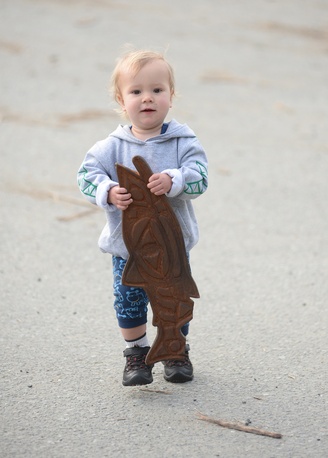Press release from the Yurok Tribe:

Yurok Eddie Norris carries one of the beautifully carved salmon, which will travel approximately 300 miles from the beginning of the Klamath River to its headwaters. Photo: Yurok Tribe.
As the sun begins to ascend on Friday morning, a team of Yurok Tribal and non-Tribal community members will kick off the 15th Annual Klamath Salmon Run, a long distance relay event that seeks to shine a spotlight on the Klamath River’s failing fish runs as well as the actions that are being taken to restore this vital watershed.
“This year’s Klamath River salmon prediction is worse than it’s ever been before,” said Georgiana Gensaw, an event organizer and Yurok Tribal member. “For the first time ever, we are going to have to tell my two boys that they won’t be able to fish with their father, which is something I never thought could happen. My boys get more excited about setting a net with their dad than they do about getting out of school for summer.”
This fall, only 11,000 Chinook salmon are expected to return to the Klamath River, making it the smallest run in recorded history. The Yurok Tribe’s allocation is only 650 salmon or one fish per 10 members of the Tribe. The meager quota, a fraction of the Tribe’s typical allotment, is not enough to meet the Tribe’s ceremonial and subsistence needs. As part of a far- reaching effort to preserve the Klamath salmon population for future generations, the Yurok Tribal Council canceled the 2017 commercial fishery.
The annual Klamath Salmon Run begins on the Yurok Reservation with a traditional prayer, which is followed by runners dipping ornately carved salmon in the exact spot where the Klamath River meets the Pacific Ocean. A group of Tribal and non-Tribal community members will take the fish to the Klamath River’s confluence with the Trinity River at the Yurok village of Weitchpec. There, one group will continue up the Klamath and another up the Trinity. Over three days, more than 200 runners will carry the fish for approximately 300 miles, through Yurok, Hupa, Karuk and Klamath Tribes of Oregon’s territory, tracing the route that spawning salmon took prior to the installation of the lower four Klamath dams.
For the Yurok, Karuk and Hoopa Valley Tribes, all of which will have representatives in the Salmon Run, this year’s fisheries failure represents a threat to a prosperous existence that has revolved around salmon since time immemorial. Unfortunately, the Klamath Tribes of Oregon, whose homelands are above the Klamath dams, know all too well what it is like to lose salmon. “We have not had salmon here for over 100 years. This led us to rely more on the resident c’wam, or sucker, which also faces extinction because of a century of poor water management. Nowadays, we get to harvest one c’wam a year for ceremonial purposes,” said, Don Gentry, the Klamath Tribes’ Chairman.
In a few short years, real salmon will likely once again reach the Klamath Tribes of Oregon. PacifiCorp recently applied to surrender the lower four Klamath dams for demolition in 2020. Dam removal will open up hundreds of miles of salmon spawning habitat and is the single best action that can be taken to improve fish populations on the Klamath.
While dam removal has created a real cause for optimism, there is a new potential challenge to the long-term sustainability of the Klamath salmon. Veresen Inc., a Canadian corporation, recently announced that it will again seek approval to construct a 232-mile long pipeline from Malin, OR to Coos Bay, OR, for the purpose of shipping fracked natural gas to Asia. The plans for the proposed pipeline include tunneling under the Klamath River as well as five additional large watersheds in Oregon.
“If approved, this risky project will put all adjacent and down river communities in jeopardy, not to mention 20-years of restoration work on the Klamath River,” Gensaw explained. “The Jordan Cove terminal and Pacific Connector Pipeline cannot be allowed to proceed. It is time to heal the Klamath and prioritize salmon production over river destruction.”
The Salmon Run was started in 2003 by four Hoopa High School Students, Erica Chase, Kayla Carpenter, Tosha Norton and Chelsea Reed in response to the 2002 Fish Kill on the Lower Klamath River. The 2017 Salmon Run begins at 6:15am on the South Spit of the Klamath River and ends on Sunday, May 28 at the Klamath Tribes’ Annual Memorial Day Weekend Pow-wow at the Klamath County Fairgrounds.
CLICK TO MANAGE